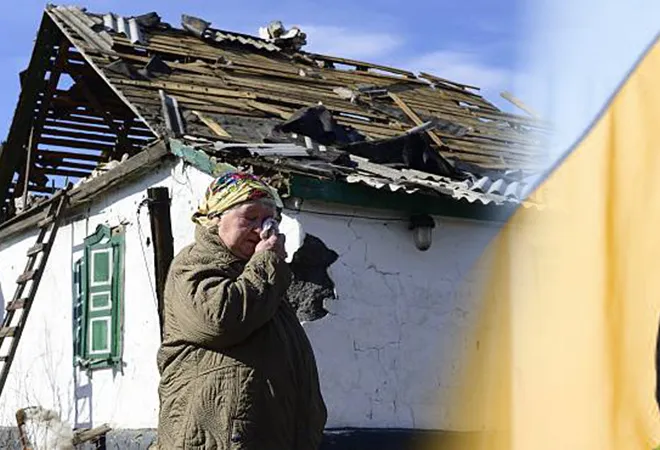
This brief is a part of
The Ukraine Crisis: Cause and Course of the Conflict.
Russia’s floundering war on Ukraine has resulted in the innocent targeting of civilians, inflicting terrible harm on people of all genders. In fact, on Monday, global outrage spread over the vast number of civilian deaths in Ukraine—as over 400 bodies were recovered with many wrapped in black trash bags—buried in mass graves found in territories recently taken over from the Russian troops. But as these horrors of war continue for the Ukrainian citizens, women in Ukraine are fighting a different kind of war, one that involves protecting themselves, their families as well as their communities.
In the face of the Russian shelling and bombing, terrifying images and videos of women giving birth in underground metro stations and newborns hastily being moved to makeshift bomb shelters have already surfaced across social media. In addition to this, claims about Russian soldiers having raped Ukrainian women and minor girls as young as 10 years old have also been floating around. Yet, the disproportionate impact of the conflict on women in Ukraine has so far not been fully documented.
The deeply ingrained gender norms and patriarchal culture had traditionally limited Ukrainian women’s access to health services and justice.
Besides, official data on the crimes that are being committed against women in the Ukraine–Russia conflict also remain missing. However, the blatant truth is that amidst Russia’s military invasion of Ukraine, women in Ukraine have lost their access to services; have been burdened with additional caregiving responsibilities; and have become even more vulnerable to sexual exploitation and abuse, thereby, shouldering a disproportionate burden of the conflict with little national and international accountability.
No Access to Services
To begin with, the deeply ingrained gender norms and patriarchal culture had traditionally limited Ukrainian women’s access to health services and justice. But in light of the ongoing crisis, their inabilities and lack of ability to find safe spaces have only been further exaggerated.
With the normal protection structures and support systems now broken down—owing to Russia’s military invasion—there is in fact, a massive contraction of routine health services and restrictions, which has created additional barriers to women’s access to even basic health services including sexual and reproductive care.
About 75 percent of the Ukrainian women reported experiencing some form of violence since the age of 15, and one in three reported experiencing physical form of sexual violence.
The news about the death of a pregnant woman on a stretcher holding her swollen belly, underscores the vulnerabilities of those who require prenatal care. And as estimates suggest, nearly 80,000 women are likely to give birth in the next three months in Ukraine. However, if these to-be-mothers continue to be deprived of critical maternal health services, the experience of childbirth could be life-threatening for them.
Sexual violence and rape
In addition to this, is the problem of gender-based violence—which the Ukrainian women including those who have been living in the shadow conflict in eastern Ukraine for the last eight years—know too well. According to a study published by the United Nations Population Fund (UNFPA) in 2019, about 75 percent of the Ukrainian women reported experiencing some form of violence since the age of 15, and one in three reported experiencing physical form of sexual violence.
Given that in conflicts, sexual violence and rape are often used as a weapon of war in an attempt to display power over the enemy, the Ukrainian women—amidst Russia’s military invasion of their country—are at a heightened risk of sexual and physical violence, abuse, rape, and torture.
A Ukrainian MP, Lesia Vasylenk has in fact gone ahead and claimed that the Russian troops have raped women and left their bodies branded with swastika shapes burns. These statements have, however, so far not been verified but if it holds any amount of truth, these images can be used as evidence to build a case of war crimes committed by Russia.
In Ukraine, women have customarily been viewed as the sole caregivers and providers, who have the primary responsibility of nurturing their children, families, and the old ones.
Another factor adding to women’s increased vulnerability to gender-based violence is the widespread displacement due to the conflict where the willingness to stay alive in a foreign country often forces women to adopt negative coping mechanisms such as child marriage and survival sex that could eventually lead to their exploitation and abuse.
Additional care burden
Besides, in Ukraine, women have customarily been viewed as the sole caregivers and providers, who have the primary responsibility of nurturing their children, families, and the old ones. But with the Ukrainian government’s recent order amidst the Russian invasion, which requires men aged between 18–40 years to stay back and fight for the country, the Ukrainian women are now being confronted with new and stressful caregiving responsibilities.
For instance, with their family unit fractured, the Ukrainian women are left with little income to feed and take care of their families. To make matters worse, women and children have had to flee for their lives alone with little help and assistance to resettle in refugee countries. According to the International Organisation for Migration (IOM), women and children account for more than half of the 10 million people who have already thought to have fled their homes in Ukraine because of the invasion.
These increasing familial burdens could overload women’s capacity to cope, thereby, leaving them with mental health concerns including but not limited to anxiety, trauma, and depression.
Conclusion
The Russia–Ukraine war has thus, clearly cemented the old gender roles and to some extent, created new ones, thereby, bringing with it devastating consequences for women. However, to ensure a long-term and peaceful solution of this ongoing problem, a gendered analysis of the situation in Ukraine is not only important but also urgent.
The views expressed above belong to the author(s). ORF research and analyses now available on Telegram! Click here to access our curated content — blogs, longforms and interviews.



 This brief is a part of
This brief is a part of  PREV
PREV


